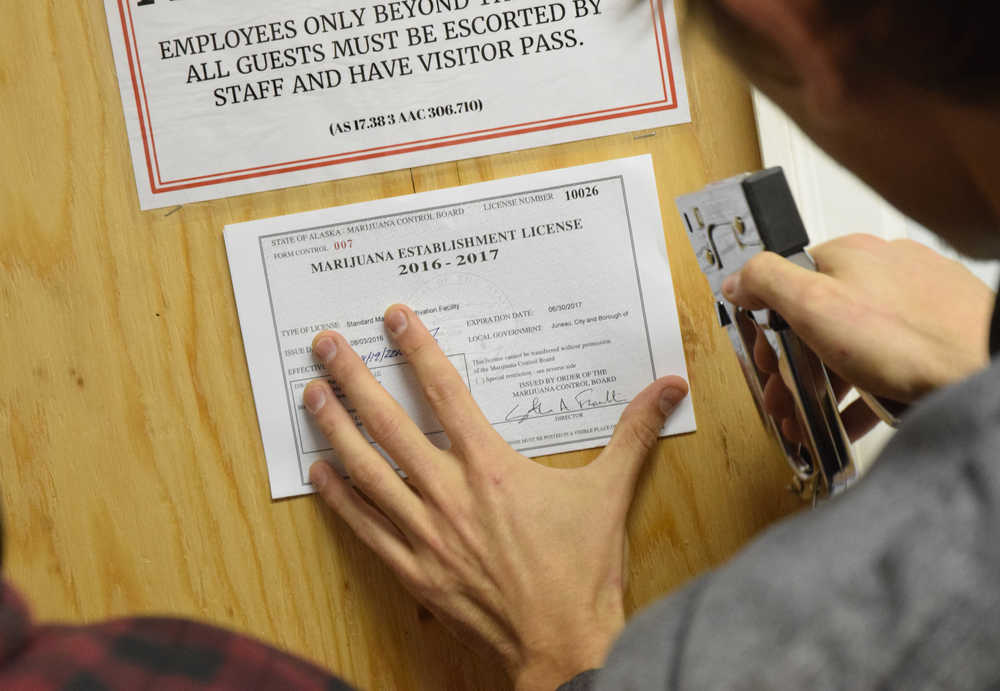Each plant is only a few inches high, but the 262 sprigs of green in one Lemon Creek building are a sign that something big is coming. This is Juneau’s first legal commercial cannabis farm, which on Friday was certified and given permission to start full-scale production.
“It’s cool to think that someone’s going to purchase the cannabis that comes off of these. I know that’s pretty straightforward, but it’s exciting to me,” said James Barrett, one of two brothers behind Rainforest Farms, which has been leading the development of a commercial cannabis industry in Juneau.
“They have their license in hand, and they’re good to go,” said Steve Johnson, the Alcohol and Marijuana Control Office inspector who visited the farm Friday.
One other cannabis growing operation has received permission to grow in Juneau but has not yet passed inspection. Several others are awaiting state permission.
In 2014, Alaska voters approved the establishment of a legal industry for recreational marijuana use. Since 1998, Alaska has legalized marijuana for medical use, and a state supreme court decision has permitted the home growth and use of marijuana since the 1970s.
Alaska has never had a system of legal dispensaries, however, and in the two years since the 2014 vote, the state’s new Marijuana Control Board has drafted a system of regulations and checks that will Alaskans to grow, sell and buy a plant the federal government still calls illegal.
Rainforest Farms and the Barretts — James, Gionno and Eric — have been vocal advocates for the nascent cannabis industry at the state and local level. Now, they’re ready to start growing.
They received their final state inspection on Friday morning, and on Saturday, James wielded a staple gun to firmly affix a new license to a wooden board just outside the front door.
“At this point, now that we have our license, it’s all real,” James said.
While Rainforest Farms has its license and a few hundred cannabis plants in gallon-sized pots, there’s still a lot of work ahead for the company, which allowed the Empire to tour its growing facility.
The marijuana growing process takes about three and a half months, Gionno explained. First, plants need to be cloned from cuttings taken from ‘mother’ plants. These clones — only female plants bear flowers, which encourages cloning — need two weeks to grow.
From there, it’s another three weeks to a month in a vegetative room.
In that room, sunlight-quality lamps are kept lit 24 hours a day to ensure maximum growth.
After that month, the plants are moved to a flowering room, where lights are turned on for just 12 hours a day, mimicking the day/night cycle of the autumn equinox. This encourages the plants to flower. In the wild, the plants use those flowers for reproduction. At Rainforest Farms, the flower buds are collected after two months and taken into a drying room.
After 7 to 10 days there, the cannabis can be packaged and cured for additional time, or it can be sold.
For Rainforest Farms, that selling won’t happen until mid-October at the earliest, the Barretts said.
That might disappoint cannabis enthusiasts who were hoping for legal sales in the first week of September, when the Marijuana Control Board is expected to approve the first licenses for retail cannabis stores.
Those licenses won’t mean much until the stores have legal cannabis to sell, and that cannabis must come from a licensed grower — a store can’t sell black-market cannabis.
Alongside each of the plants in Rainforest Farms’ facility is a small blue identity tag. One of these tags adorns each of the thousands of legal cannabis plants now growing in Alaska. Each tag is entered into a computer database, and inspectors can track any individual plant from the time it is cloned to when it is separated from its buds and those are sold over the counter.
No tag means no sale.
The Barretts are growing 55 varietals of cannabis and plan to offer as many as 30 at a time when their store opens. They are not initially offering edible cannabis products, and not all of the varieties will last. They’ll figure out which ones stay based on what people want and what sells.
“It’s still experimental,” Gionno said. “We’re trying to get the consumer to figure out what they want and develop a palate. It’s a trial and error process, but it’s a fun process.”
• Contact Empire reporter James Brooks at james.k.brooks@juneauempire.com or 523-2258.

